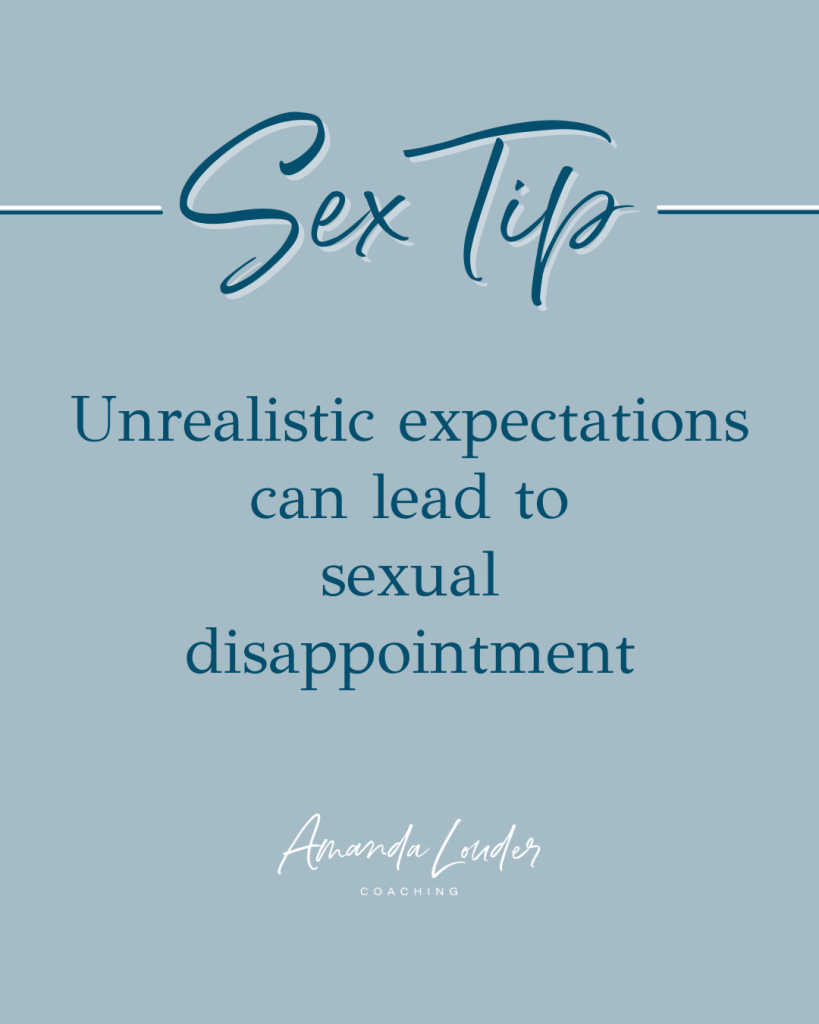
Sexual disappointment is a complex emotion. Whenever we have expectations and those expectations aren’t being met, it’s natural to be disappointed. But what really matters is how we deal with that disappointment. Do we pretend we’re fine? Do we get angry? Do we avoid the emotion? Or do we talk about it? We are surrounded by examples of what a ‘real’ sexual experience should look like, but they aren’t reality. Having desires and fantasies is wonderful, but once we let in the expectations, that’s where disappointment comes from. Let’s talk about what we can do to overcome the sexual disappointment in our relationships that’s causing us to be disconnected from our spouse.
Show Notes:
Follow Amanda on Facebook and Instagram.
Join Amanda’s Private Facebook Group.
Show Summary:
When things don’t go the way you had hoped or expected, it is normal to feel disappointment. And when we are feeling let down, dissatisfied, or disappointed when our sexual experiences don’t meet our expectations, it’s normal to feel sexual disappointment.
Disappointment itself is a complex emotion. When we experience disappointment, it’s often because our expectations haven’t been met. In the context of marriage, sexual expectations can be deeply ingrained and influenced by societal norms, personal desires, and past experiences. When these expectations aren’t fulfilled, it can lead to feelings of frustration, sadness, and even anger.
Moreover, sexual disappointment can trigger deeper insecurities and vulnerabilities within us. It can make us question our attractiveness, desirability, and worth as a partner. We might wonder if there’s something wrong with us or if our spouse is no longer interested in us. These thoughts can be incredibly distressing and can erode our self-esteem over time.
Additionally, sexual disappointment can disrupt the emotional connection between partners. Intimacy is a fundamental aspect of marriage, and when it feels lacking or unsatisfactory, it can create a sense of disconnection and loneliness. This, in turn, can lead to a breakdown in communication and further exacerbate the problem.
Another reason why sexual disappointment is so hard to deal with is the stigma and taboo surrounding discussions about sex. Many couples find it difficult to talk openly about their sexual needs and desires due to shame, embarrassment, or fear of judgment. This lack of communication can create a cycle of frustration and misunderstanding, making it even harder to resolve sexual issues.
Furthermore, our culture often places a strong emphasis on performance and pleasure when it comes to sex. There’s a pressure to always have amazing, mind-blowing experiences in the bedroom, which can be unrealistic and unattainable. When couples fall short of these expectations, it can lead to feelings of inadequacy and disappointment.
Finally, sexual disappointment can be particularly challenging because it touches on such intimate and personal aspects of our lives. Our sexuality is deeply intertwined with our sense of identity, and when it feels unsatisfactory, it can shake us to our core. It requires a great deal of vulnerability and courage to confront these feelings with our partners and work towards a resolution.
In essence, sexual disappointment is hard to deal with because it strikes at the heart of our relationships, our sense of self, and our deepest desires. However, by acknowledging these challenges and approaching them with empathy, openness, and a willingness to work together, couples can overcome sexual disappointment and strengthen their bond in the process.
Now, there can be numerous reasons why we might experience sexual disappointment in our marriages. It could be due to mismatched libidos, unmet expectations, getting turned down, unresolved conflicts outside the bedroom, stress, fatigue, or even physical issues. Whatever the cause, it’s essential to address it rather than sweep it under the rug.
When addressing it, it’s important to remember that disappointment is a normal emotion when you don’t get what you want or expected. Disappointment is a valid emotion. But often when we feel disappointed about something, one of three things happens.
- We react to it by getting angry, withdrawing, disconnecting, and punishing
- We resist it and pretend that we aren’t disappointed, which usually means we will explode later
- We try to avoid the emotion by distracting ourselves.
None of these are healthy options. So how should we deal with it when it arises. First, we need to acknowledge to ourselves that what we are feeling is normal given the circumstances. Give ourselves space to feel what we need to feel without reacting to it, resisting it, or avoiding it. Once we have made sure we are calm and can have a productive conversation about it, we need to communicate with our partner without judgment or blame. Here’s an example of how I like to outline these conversations
I’d like to talk to you about something important to me, would now be a good time? When I ask you if you want to have sex and you say no, I’m disappointed because I had the expectation of sex tonight. My brain starts to tell me stories about how you must not find me attractive or you don’t love me anymore, which is really hard. It’s ok that I am disappointed, it’s not your job to solve for my disappointment. I’m also working on the stories that I tell myself. But I was wondering if you would be open to finding a time that the two of us can be sexual in the next few days because I really love you and I would love to connect with you this way.”
With this conversation you are:
- Making sure it’s a good time
- Stating what happened
- Letting your spouse know how you and thinking and feeling
- Taking ownership over your own emotions
- Asking to collaborate on a solution together
Will this always work? No, it won’t. But the chances of it working are a lot higher than if you blame, judge, or expect your spouse to solve things for you.
Another good thing to keep in mind is that it’s important for you to manage your own expectations. Having sexual expectations within marriage isn’t inherently problematic, but it can become an issue when those expectations are unrealistic, uncommunicated, or rigid. Here are some potential problems associated with having sexual expectations within marriage:
- Unrealistic Expectations: Expecting every sexual encounter to be perfect or mirror what we see in movies or read in romance novels can set couples up for disappointment. Real-life intimacy is diverse and doesn’t always align with fantasy. Unrealistic expectations can lead to feelings of inadequacy, frustration, and dissatisfaction when reality falls short.
- Pressure and Performance Anxiety: When one or both partners feel pressured to meet certain sexual expectations, it can create performance anxiety and hinder enjoyment. The pressure to perform can detract from the intimacy and connection that should be the focus of sexual encounters, leading to stress and tension in the relationship.
- Communication Barriers: If sexual expectations are uncommunicated or assumed, it can lead to misunderstandings and resentment. Each partner may have different desires, preferences, and boundaries when it comes to sex. Without open communication, it’s challenging to understand and meet each other’s needs, leading to dissatisfaction and conflict.
- Comparison and Insecurity: Comparing one’s sex life to that of others or to idealized standards can breed insecurity and jealousy within the relationship. Feeling like you’re not living up to societal or personal expectations can damage self-esteem and create feelings of inadequacy. It’s essential to focus on the unique dynamics and connection between partners rather than external benchmarks.
- Lack of Flexibility: Rigid sexual expectations can stifle spontaneity and exploration within the relationship. When couples feel constrained by preset notions of what sex should be like, they may miss out on opportunities for growth, discovery, and deepening intimacy. Being open to new experiences and adapting to each other’s changing desires is essential for a healthy, fulfilling sex life.
- Impact on Libido: High or mismatched sexual expectations can put undue pressure on one or both partners, leading to changes in libido. Feeling obligated to meet certain standards or frequency of sexual activity can diminish desire and lead to avoidance or resentment. It’s crucial for couples to find a balance that honors both partners’ needs and desires.
Overall, while having sexual expectations within marriage is natural, it’s essential to approach them with flexibility, communication, and empathy. Couples who openly discuss their desires, boundaries, and fantasies can cultivate a sex life that is satisfying, fulfilling, and sustainable for both partners.
I always say that expectations (especially ones that are unrealistic, uncommunicated, or rigid) are just setting yourself up for disappointment and resentment. Can you have a want? A desire? Absolutely! And even with those you might experience some disappointment. But an expectation is almost sure to.
I think it’s also important to understand that most people don’t really know what to expect in a sexual relationship if you’ve never had one before, despite what you see in the media. So understanding that there will be ups and downs, you will get turned down, and every sexual encounter is not going to be mind-blowing is good to remember.
Preventing sexual disappointment involves proactive steps. Prioritize your relationship by making time for intimacy, both physical and emotional. Explore new ways to connect with your partner and keep the passion alive. Remember, it’s not just about the act itself but the connection it fosters between you and your spouse.
Maintaining connection with your spouse during times of sexual disappointment is crucial. It’s easy to withdraw or blame each other when things aren’t going as planned, but that only leads to further distance. Instead, focus on strengthening your emotional bond through affection, communication, and shared experiences.
If you do find yourselves disconnected after disappointment, it’s important to work on reconnecting with your spouse. Here are some strategies to help you:
- Open Communication: Start by having an open and honest conversation about what happened and how you both feel. Avoid blaming or criticizing each other and instead focus on expressing your own feelings and listening to your partner’s perspective. Use “I” statements to communicate your emotions without assigning fault.
- Validate Each Other’s Feelings: Validate your partner’s feelings and experiences, even if they differ from your own. Let them know that you understand and empathize with what they’re going through. Feeling heard and understood is essential for rebuilding trust and connection.
- Reaffirm Your Love and Commitment: Remind each other of your love and commitment to the relationship. Reassure your partner that you’re in this together and that you’re committed to working through any challenges that arise. Expressing affection and appreciation can help rebuild the emotional bond between you.
- Focus on Emotional Intimacy: Prioritize emotional intimacy by spending quality time together, engaging in meaningful conversations, and sharing your thoughts and feelings with each other. Building a strong emotional connection lays the foundation for a satisfying and fulfilling sex life.
- Explore Non-Sexual Forms of Intimacy: Take the pressure off by focusing on non-sexual forms of intimacy, such as cuddling, holding hands, kissing, or giving each other massages. Physical touch releases oxytocin, the “bonding hormone,” which can help strengthen your connection and foster feelings of closeness.
- Set Realistic Expectations: Understand that reconnecting after disappointment takes time and patience. Don’t expect things to go back to normal overnight. Be realistic about the progress you’re making and celebrate small victories along the way.
- Seek Professional Help if Needed: If you’re struggling to reconnect on your own, don’t hesitate to seek the guidance of a therapist or counselor who specializes in couples therapy. A trained professional can provide you with tools and strategies to navigate through challenges and rebuild your relationship.
Remember, love is a journey, not a destination. Stay committed, stay passionate, and stay connected. Goodbye for now.





